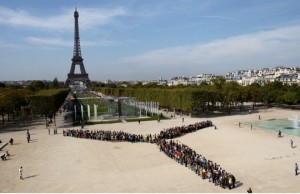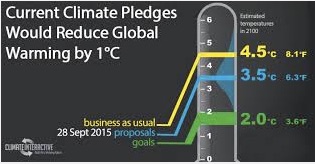Heading to Paris: there are some hopeful signals emerging from all the noise surrounding climate change talks BUT there is a helluva storm coming right behind those signals
Perhaps the largest change from previous talks involving the Conferences of the Parties (COP) is that we have dropped the attempted COP imposition of a global emission target to be divided amongst all the countries, as in the Kyoto Protocol. While these targets had the appearance of some legally binding effect, the legal effect was largely illusionary with little actual enforcement capability. That approach failed at Copenhagen in 2009 although there was a commitment to try harder next time. For Paris, the COP has adopted the approach of each country submitting its own “intended nationally determined contributions” or INDCs. These are closer to “voluntary” commitments than enforceable targets, but at least each country is now in charge of setting its own commitment. By now most of the major countries have submitted their INDC and some are hopeful that if all the commitments are actually carried out it may be possible to hold global warming at 2.7°C above the pre-industrial era.
For the first time, the Intergovernmental Panel on Climate Change (IPCC) process has most countries engaged formally in efforts to reduce GHGs to try and save the planet. No small achievement. If only it were enough. See below, BUT…
Just as the larger climate talks appear to offer a ray of realistic hope for a global “deal” in Paris, there are also a number of smaller signals strengthening the consensus on the need to act on climate change.
The cost of renewables, especially solar and wind, continues to drop making such sources of energy directly competitive with fossil fuels, and they continue to spread in many countries. Shell has abandoned extremely risky exploration for hard-to-get oil in Alaska, at least for the near future. The US and China have moved significantly in their individual and collective actions to address climate change, providing much support for the EU early efforts. Mark Carney, governor of the Bank of England, publically warned of the real risk of fossil fuel assets being stranded because of growing regulation over greenhouse gas (GHG) emissions. The insurance companies have understood climate change for years as they are on the front-line of paying for costs of damages from extreme weather events. Pope Francis’ encyclical and speeches during his visit to the US have added a strong moral voice to the climate talks.
Even smaller gestures are appreciated. Krakow, the second largest town in coal-friendly Poland, is moving to ban coal-burning despite the critical position of coal industry in Poland’s economy.
Ireland has finally banned coal fires in domestic homes throughout the country after earlier bans in larger towns, although its climate change bill is toothless and its agriculture sector runs wild with methane emissions.
On the legal enforcement front, a Netherlands court held that the national government must cut greenhouse gas emissions by 25 percent, compared to 1990 levels, by 2020. A Pakistan court ruled that the country must do more to protect its citizens from climate change, ordering the creation of a “climate council” to ensure that Pakistan’s climate commitments are followed, and then the court named 21 people to serve on the council. And ClientEarth is moving to sue corporate leaders for failing to address climate change impacts on environment and on their companies’ fiscal health.
The Dutch have created the largest wave machine in the world. When you need something engineered and thoughtful, and intended to save a space from too much water, you can’t go wrong with the Dutch
There are even signals, however faint, that Republicans in the US seem ok with a revenue-neutral “pricing” (not a tax) on carbon as it does not provide big government with more money to spend on entitlement benefits.
BUT,
recent analyses are indicating that even if all the commitments made in the INDCs are actually fulfilled, we will experience a global warming more that 2°C (3.6°F), and likely substantially more than 2°C.
First, a rise of just 2°C will “still destroy most coral reefs and glaciers and melt significant parts of the Greenland ice cap, bringing major rises in sea levels.” McKie, Guardian. So 2°C represents, for many, an unacceptable risk. A warming of substantially more than 2°C will, of course, cause substantially more of everything: damage, destruction, disaster, catastrophe.
Second, if we want a 66% chance of staying below 2°C warming, the world has only 765 gigatons of CO2 left in our carbon budget. “If the United States, EU, and China all followed through on their current emissions pledges, they’d consume practically the world’s entire carbon budget by 2030 — leaving only scraps for the rest of the world…. That’s untenable. The “rest of the world” is where most of humanity lives — 5 billion people. It includes India.” Plumer, Vox
Third, even if all the countries participating in the global climate talks do what they promise, and that is an ambitious hope, it is not even close to being enough. They all will have to do much, much more.
Fourth, no one wants to spread that message. Certainly not the politicians. Not even the scientists.
So some believe that the most that can be hoped for is that the COP talks in Paris will strike a global deal based on the INDCs and will include some sort of process for the parties to revisit their commitments, soon, and increase their efforts, perhaps with carbon pricing, in response to what likely will be increasingly more destruction from climate change.
In the meantime, it looks like we’ll need the Pope’s prayers as much as anything else.
Sources
“The Guardian view on the Paris climate change summit: reasons to be cheerful,” The Guardian (4 Oct 2015). www.theguardian.com/commentisfree/2015/oct/04/the-guardian-view-on-the-paris-climate-change-summit-reasons-to-be-cheerful
James Thornton, ClientEarth: “Why we’ll sue CEOs who ignore climate change,” The Guardian (8 Oct 2015). www.theguardian.com/sustainable-business/2015/oct/08/business-boss-legal-action-court-climate-change
Dutch create world’s biggest artificial wave to test flood defences,” The Guardian (6 Oct 2015). www.theguardian.com/world/2015/oct/06/dutch-unveil-worlds-biggest-wave-as-they-aim-to-save-dykes-from-destruction
Jeremy Leggett, “Business should be backing renewables – fossil fuels don’t make economic sense,” The Guardian (6 Oct 2015). www.theguardian.com/business/economics-blog/2015/oct/06/conservatives-21st-century-energy-crisis-20th-century-fuels
Oliver Milman, “UN drops plan to help move climate-change affected people,” The Guardian (7 Oct 2015). www.theguardian.com/environment/2015/oct/07/un-drops-plan-to-create-group-to-relocate-climate-change-affected-people
Terry Macalister, “Onshore windfarms cheapest form of UK electricity, report shows,” The Guardian (7 Oct 2015). www.theguardian.com/environment/2015/oct/07/onshore-wind-farms-cheapest-form-of-uk-electricity-report-shows
Arthur Neslen, “Poland’s second city to ban coal use after anti-smog law approved,” The Guardian (7 Oct 2015) www.theguardian.com/environment/2015/oct/07/poland-krakow-ban-coal-use-anti-smog-law
Catastrophe Modelling by Insurance Companies: Building Climate Change Impacts into Doing Business in Reports section of irish environment magazine (June 2014). www.irishenvironment.com/reports/catastrophe-modelling-by-insurance-companies-building-climate-change-impacts-into-doing-business/
“First the Netherlands, now Pakistan’s high court comes to defence of climate,” The Guardian (7 Oct 2015). www.theguardian.com/environment/2015/oct/07/pakistan-high-court-comes-to-defence-of-climate
Natasha Geiling, “Pakistan Now Has A 21-Person ‘Climate Council,’ Thanks To A Judge’s Ruling,” climate progress (7 Oct 2015). thinkprogress.org/climate/2015/10/07/3710023/pakistan-court-climate-change/
Eduardo Porter, “Bringing Republicans to the Talks on Climate,” The New York Times (14 Oct 2015). www.nytimes.com/2015/10/14/business/economy/bringing-republicans-to-the-climate-change-table.html
Heather Smith, “How do you make conservatives care about climate change? An expert shares tips.” Grist (16 Oct 2015). grist.org/climate-energy/how-do-you-make-conservatives-care-about-climate-change-an-expert-shares-tips/
Robin McKie, “World will pass crucial 2C global warming limit, experts warn,” The Guardian (10 Oct 2015). www.theguardian.com/environment/2015/oct/10/climate-2c-global-warming-target-fail
David Roberts, ”The awful truth about climate change no one wants to admit,” VOX (15 May 2015). www.vox.com/2015/5/15/8612113/truth-climate-change
Brad Plumer, “The math on staying below 2°C of global warming looks increasingly brutal,” VOX (19 Oct 2015). www.vox.com/2015/10/19/9567863/climate-change-ambitious-cuts
Samantha Page, “A Global Agreement On Climate Change Likely Won’t Include Carbon Pricing: But is carbon pricing ‘inevitable’?” originally published in ThinkProgress (27 Oct 2015) thinkprogress.org/climate/2015/10/27/3716565/figueres-carbon-pricing/ and re-published in this issue (1 Nov 2015) of irish environment magazine.




No comments yet, add your own below